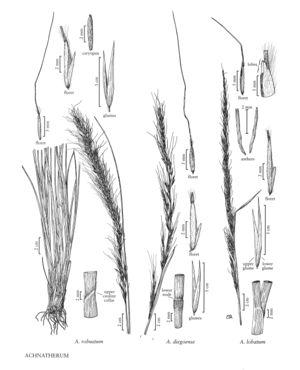Difference between revisions of "Achnatherum lobatum"
FNA>Volume Importer |
imported>Volume Importer |
||
| (4 intermediate revisions by 2 users not shown) | |||
| Line 7: | Line 7: | ||
|synonyms={{Treatment/ID/Synonym | |synonyms={{Treatment/ID/Synonym | ||
|name=Stipa lobata | |name=Stipa lobata | ||
| − | |authority= | + | |authority= |
| + | |rank=species | ||
}} | }} | ||
|hierarchy=Poaceae;Poaceae subfam. Pooideae;Poaceae tribe Stipeae;Achnatherum;Achnatherum lobatum | |hierarchy=Poaceae;Poaceae subfam. Pooideae;Poaceae tribe Stipeae;Achnatherum;Achnatherum lobatum | ||
| Line 20: | Line 21: | ||
-->{{Treatment/Body | -->{{Treatment/Body | ||
|distribution=Ariz.;N.Mex.;Tex. | |distribution=Ariz.;N.Mex.;Tex. | ||
| − | |discussion=<p>Achnatherum lobatum grows on rocky, open slopes in pinyon-pine and white fir associations of southern Arizona, New Mexico, Texas, and northern Mexico, at 2100-2800 m. It flowers from mid- to late summer.</p><!-- | + | |discussion=<p><i>Achnatherum lobatum</i> grows on rocky, open slopes in pinyon-pine and white fir associations of southern Arizona, New Mexico, Texas, and northern Mexico, at 2100-2800 m. It flowers from mid- to late summer.</p><!-- |
| − | --><p>Achnatherum lobatum is similar to A. scribneri and A. perplexum. It differs from A. scribneri in its shorter apical lemma hairs and blunt calluses, and from A. perplexum in having longer lemma lobes and erect apical hairs.</p> | + | --><p><i>Achnatherum lobatum</i> is similar to <i>A. scribneri</i> and <i>A. perplexum</i>. It differs from <i>A. scribneri</i> in its shorter apical lemma hairs and blunt calluses, and from <i>A. perplexum</i> in having longer lemma lobes and erect apical hairs.</p> |
|tables= | |tables= | ||
|references= | |references= | ||
| Line 30: | Line 31: | ||
-->{{#Taxon: | -->{{#Taxon: | ||
name=Achnatherum lobatum | name=Achnatherum lobatum | ||
| − | |||
|authority=(Swallen) Barkworth | |authority=(Swallen) Barkworth | ||
|rank=species | |rank=species | ||
| Line 38: | Line 38: | ||
|family=Poaceae | |family=Poaceae | ||
|illustrator=Cindy Roché | |illustrator=Cindy Roché | ||
| + | |illustration copyright=Utah State University | ||
|distribution=Ariz.;N.Mex.;Tex. | |distribution=Ariz.;N.Mex.;Tex. | ||
|reference=None | |reference=None | ||
| Line 43: | Line 44: | ||
|publication year= | |publication year= | ||
|special status= | |special status= | ||
| − | |source xml=https:// | + | |source xml=https://bitbucket.org/aafc-mbb/fna-data-curation/src/200273ad09963decb8fc72550212de541d86569d/coarse_grained_fna_xml/V24/V24_175.xml |
|subfamily=Poaceae subfam. Pooideae | |subfamily=Poaceae subfam. Pooideae | ||
|tribe=Poaceae tribe Stipeae | |tribe=Poaceae tribe Stipeae | ||
Latest revision as of 16:22, 11 May 2021
Plants cespitose, not rhizomatous. Culms 40-100 cm tall, 0.6-2.6 mm thick, glabrous or sparsely pubescent to 5 mm below the lower nodes; nodes 4. Basal sheaths becoming flat and papery in age, margins some¬times ciliate distally, cilia to 0.5 mm; collars, including the sides, glabrous or sparsely pubescent, collars of the flag leaves glabrous; basal ligules 0.2-1.3 mm, membranous, truncate, erose to ciliate, cilia about 0.05 mm; upper ligules 0.3-1 mm; blades 1-4 mm wide, abaxial surfaces smooth, adaxial surfaces scabrous. Panicles 12-28 cm long, 0.5-1.5 cm wide; branches ascending to appressed, straight, longest branches 3-6 cm. Spikelets appressed to the branches. Glumes unequal; lower glumes 9.5-12.5 mm long, 0.8-1.2 mm wide, 3(5, 7)-veined, apices straight to somewhat recurved; upper glumes 2-3.5 mm shorter, 3-veined; florets 5.5-7.5 mm long, 0.6-1.1 mm thick, terete, widest about midlength; calluses 0.3-0.5 mm, blunt; lemmas evenly hairy, hairs at midlength 0.7-1.2 mm, fusiform, terete, apical hairs 1.3-2.2 mm, erect, usually less than 1 mm longer than those at midlength, apical lobes 0.5-1.2 mm, membranous, flexible; awns 10-22 mm, persistent, once- or twice-geniculate, scabrous, terminal segments straight; paleas 3-4.3 mm, 3/5 – 3/4 as long as the lemmas, pubescent, hairs exceeding the apices, veins terminating below the apices, apices flat, rounded; anthers 3-4 mm, dehiscent, sparsely penicillate, hairs about 0.1 mm. 2n = unknown.
Distribution
Ariz., N.Mex., Tex.
Discussion
Achnatherum lobatum grows on rocky, open slopes in pinyon-pine and white fir associations of southern Arizona, New Mexico, Texas, and northern Mexico, at 2100-2800 m. It flowers from mid- to late summer.
Achnatherum lobatum is similar to A. scribneri and A. perplexum. It differs from A. scribneri in its shorter apical lemma hairs and blunt calluses, and from A. perplexum in having longer lemma lobes and erect apical hairs.
Selected References
None.
